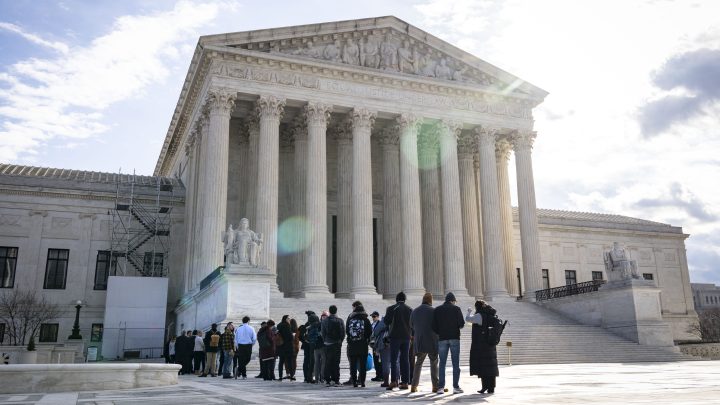
A Supreme Court case involving Google raises questions about how tech manages content
A Supreme Court case involving Google raises questions about how tech manages content

Google had its day in court on Tuesday. The Supreme Court, that is.
YouTube’s parent company is the defendant in a case that centers around Section 230 — the part of the 1996 Communications Decency Act that shields tech platforms from legal liability over third-party content published on their sites.
Plaintiffs in the case argue that YouTube’s recommendation algorithm, which powers an autoplay feature, falls outside the protections afforded by Section 230. If the Supreme Court agrees, it could change how YouTube, Facebook, Instagram and a wide range of tech companies do business.
Nick Seaver was screen-sharing his YouTube homepage with me, which felt a little more personal than he was expecting. “Oh, this is very revealing. I see electronic music livestreams. There’s a trailer for the ‘Tetris’ movie,” he said.
Seaver researches recommendation engines at Tufts University. YouTube would argue that the platform wouldn’t be useful without that controversial algorithm, he said. How else would he find that perfect soundscape?
“The scale of these platforms is so overwhelming,” Seaver said. “There’s so many videos on YouTube that you need some kind of recommender to navigate you through that information overload.”
And, by chance, navigate you to the perfectly tailored advertisement as well. Right now, if that recommendation algorithm guided you to some illegal pyramid scheme or something like that, you probably couldn’t sue YouTube.
But if the Supreme Court sides against the service, “it would require them to look at what takes place on their site and make sure that terrible things are not happening,” said Darrell West at the Brookings Institution. “And if they don’t do that, people could sue them. It could cost them a huge amount of money.”
And it’s not just big social media companies that would need to invest heavily in content moderation, according to Sophia Cope. She’s with the Electronic Frontier Foundation, which filed a legal brief in support of Google.
“Section 230 doesn’t apply to just social media platforms,” she said. “It actually applies to all internet intermediaries, so that includes web hosting companies like Amazon Web Services, review sites like Yelp and also email providers like Microsoft.”
Big Tech probably has the resources to pivot if the Supreme Court takes away part of that Section 230 shield, Cope added.
But the startups that want to be the next YouTube or Instagram? “The very first post on a brand-new platform could lead to three or four years of litigation that creates a huge disincentive,” Cope said.
That’s something venture capitalists are aware of too.
There’s a lot happening in the world. Through it all, Marketplace is here for you.
You rely on Marketplace to break down the world’s events and tell you how it affects you in a fact-based, approachable way. We rely on your financial support to keep making that possible.
Your donation today powers the independent journalism that you rely on. For just $5/month, you can help sustain Marketplace so we can keep reporting on the things that matter to you.

















